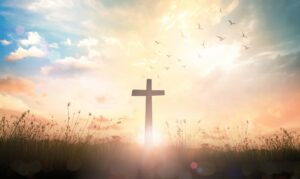2nd Sunday before Lent St Andrew’s Milngavie 2024

Today we were back in Ordinary Time, those Sundays between Candlemas and the beginning of Lent.
Our readings this morning focused on the mystery of creation, our hymns accompanied by Abigail reflected this theme.
Our Lent Group this year will start on Thursday 22nd February 3pm at All Saints, Bearsden. It will run throughout Lent on Thursday afternoons.
The book to be studied is “Rooted in Love” Lent reflections on life in Christ introduced by Rt Rev Sarah Mullallay, The Bishop of London. Let me know if you need me to order you a copy.
This Week
Tuesday 10am – Prayer Group in the Garden Room.
Thursday 10am – Said Holy Communion followed by coffee in Friendship House
Readings for next Sunday – Sunday before Lent – 2 Kings 2:1-12 2 Corinthians 4:3-6 Mark 9:2-9
Today’s readings – Proverbs 8:1,22-31, Colossians 1:15-20, John 1 1-14
Today in the gospel we hear the prologue from St John which always reminds us of the Christmas story, the birth of Christ, the origin of our saviour. It does seem slightly odd that we should have this reading today when last Sunday at the feast of Candlemas we were talking about taking one last look at the nativity story before turning our thoughts to lent Holy week and Easter.
But before we do that today we are asked to consider the mystery of Christ in the created world at the beginning of time.
The question of origan is always interesting, many of us these days, with the help of the internet, spend hours trying to trace our origins. Its an absorbing and fascinating subject and it’s no more fascinating and mysterious than in John’ gospel.
St John’s gospel is in many ways a serious gospel, beautifully written in almost poetic style it certainly digs deeper than the other three more factual accounts of the life of Christ that we find in the synoptic gospels. But if we are prepared to study and ponder its hidden depths then it tells us much about the glory, mystery and wonder of Christ our saviour and the gospel starts in just such a vein with the well-known opening words “In the beginning was the word……” John 1:1
But all the readings set for today do deal with very complex matters of faith. They speak of the creation of the universe, at the very beginning of time, a time beyond the capacity of the human brain to imagine. And they speak of God incarnate, that is the creator of the universe living a human life among us as Christ.
It is actually very difficult to articulate such mysteries. So, the prologue to the gospel of John uses poetry and imagery to convey its message in words such as “The word became flesh….the light shines in the darkness…. and we have seen his glory” wonderful and moving language! John 1:1,5,14
But the point it is making is one of deep significance. John uses the term “word” for the one who became incarnate, Jesus, echoing the wisdom language of the OT.
And by doing so he reinforces the point that the one who becomes human and lives among us is no other than the one who is present at the foundation of the world. John echoes the language of the book of Proverbs which describes Wisdom being beside God when he laid the foundations of the earth. And he also echoes the language of Genesis which also begins with the phrase,
“In the beginning…” Genesis 1:1
So, John in this gospel makes the connections between God’s actions in the beginning and his actions in Christ. The word who became flesh was “in the beginning with God. All things came into being through him.” The one who brought the very first light out of the dark wastes described in Genesis is the one who now shines in the darkness. The one who breathed life into the very first of God’s children on earth is the one who now brings new life, “the power to become children of God. “
So how can such deep matters of theology speak to us today?
First, they show the consistency of God. Jesus did not appear from nowhere as a kind of random teacher and miracle worker. The incarnation of the word is all part of God’s plan from the very beginning. Creation and recreation belong together. We can trust God, because it was he who formed our world and us in it and it was he who also cared enough for our world to come and live in it.
The God we worship today is that same creator God known to us through Christ.
Secondly, order in the universe is asserted. We are not an accident and nor is our world. The creation of the world is purposeful and so is its salvation. The world began when God spoke his Word, and it will not end until he says so. From the Greek for “word” we get our word “logic”. There is a logic in the universe, and it is God’s own logic, his purposes being worked out.
The world may seem a dark, confusing and difficult place, especially at present but we are assured that “The light shines in the darkness and the darkness has not overcome it”
And this brings hope to us.
It may sometimes in life be difficult to see God’s purposes as more than a flickering candle in the dark, but the incarnation of the word means that at least we have seen them in our own shape. In Christ incarnate we are given a glimpse of God’s purposes in human form.
“The word became flesh and lived among us, and we have seen his glory”. John 1:14
